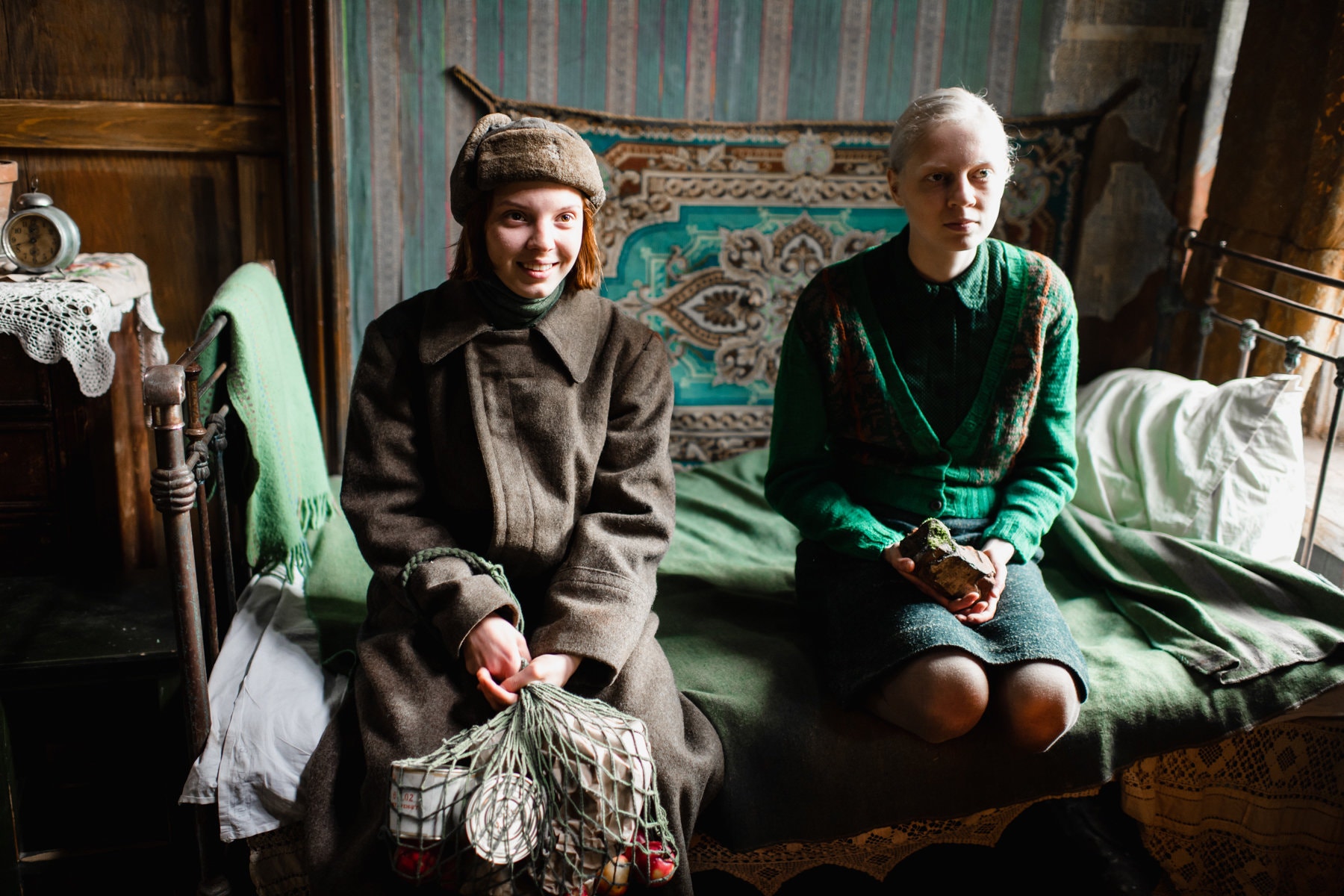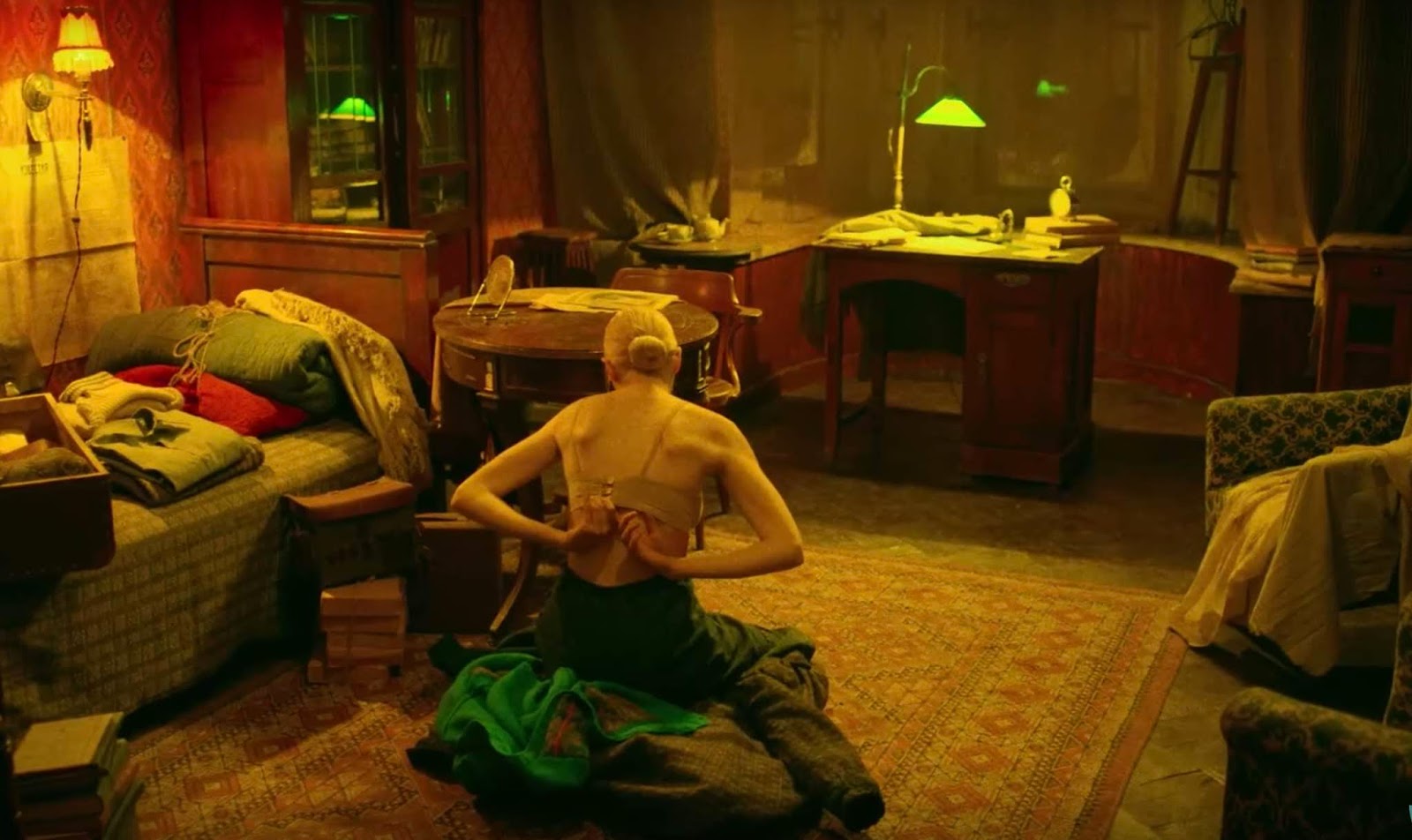
The woman with red hair and a green dress is spinning in the corner of the room. She is laughing sweetly, holding the dress up so that it would twirl more, being careful of the makeshift pins that hold the dress together. She is laughing and spinning, and spinning, and spinning, her laughter growing long and coldly ironic. She is laughing at herself, an old woman pretending to be a little girl. Her foot twists; she shakes but keeps spinning, no longer joyful in her step but wracked with grief. Her movements become swung, her back heaves out rhythmically in a way that can only be seen as crying.
This is one of the many emotionally rending scenes of Kantemere Balagov’s sophomore film Beanpole. His explorations into transcendental filmmaking are most apparent here, drawing out long breaks without dialogue, creating moments where the audience is not allowed to hear what is being said, and holding the camera hostage to paint these intense close shots. Balagov’s filmmaking is at its most potent force in this, as he explores avenues of war in a way that is distinctly unique to the Russian identity. It would be safer to file Beanpole as a character study rather than a war film, a tragedy rather than an empowerment film. Yet, Beanpole is all of these things, exploring both deeply personal and societal ideas in such a sensitive way that it feels wrong to call this just a war film.
The film shows a cleaned up Leningrad, off the heels of World War Two. The streets aren’t bombed out, there is no refuse spilling out from alleyways, there are no soldiers springing forth to protect the capital from the Germans. The horror of War follows the two main characters as they walk, biting at their heels, despite its natural end. Iya -played by Victoria Miroshnichenko- is a tall blonde woman, with a quiet naive look. She is contrasted by her counterpart Masha, (Vasilia Pereglynia) a short, warm woman with a fox-like smile. The two of them served in the same anti aircraft division during the war, bonded together in a way that is deeper than familial love. Their experience serving in the war has alienated them, being the first generation of women to fight in the war. Thus, they bring performances that are emotionally raw, hesitant in a way that feels genuinely tearing to watch. The two’s debut performances are masterful, their characters difficult, muted roles to play.
The cinematography of beanpole draws a lot from earlier transcendental filming styles. There is a lack of authorial intent in the edits. Moments feel hung in the air, the camera remaining to film the aftermath of a scene. In a way that draws itself towards multifaceted audiences the camera plays a neutral role, never judging, never making statements through edits. Audiences will be uncomfortable with the almost complete lack of music in this film, a stylistic choice that compliments the uncomfortable message Balagov seeks to tell. There are moments in this film that feel exhaustive, framed in claustrophobic and painterly angles. The film does not feel dressed up for an audience, rooms are allowed to be messy, characters are defined by their wrinkles more than none else. There is no scene where a male character is seen as taller than the two, a considerably muted way to show the heroic size of the main characters. Masha is almost always separated with her love interest using the backgrounds, whether they talk with a dividing wall between them, through the doorframe, or mismatched chairs in the dining table. It shows a deliberate emotional disconnect between the two - putting it simply, there is literally a wall between them. Colors in Beanpole are muted, backgrounds are warm yellows, greens, and reds. It is notable that scenes that represent Masha will often have red color palettes, and green for Iya. There is something cleanly simple at the camera direction taken in the film. Contrasting more mainstream filming techniques, the work in beanpole remains sanct - never casting judgment on the characters. This lack of judgement creates a very different viewing experience, allowing the audience to create their own interpretations on the two. Moral questions brought up, never answered, left to remain outside of the film. In this way beanpole is complex, lying as a way for the audience to posit their own ideas onto the media.
The film begins with Iya staring straight forward, looking but not blinking. It holds this angle for some twenty seconds, panning out to show an animate laundry room. An older woman approaches Iya, trying to stir her from her unresponsive fit. In the very first scene of the film, Balagov introduces symptoms of PTSD, and the divide between the older and younger generation, drawing the general indifference and stiffness of the old woman and juxtaposing this against our modern notions of treating mental illness. The old woman views Iya’s fit as something that interrupts her work, instead of a pressing concern. The older ones have lived the war, but Iya has fought in it, showing a fundamental schism between the two’s perceptions of war, which Balagov consistently drives home throughout the runtime of Beanpole. The early introduction of PTSD later becomes the centerpiece of Masha and Iya’s twisting relationship.
When Iya is left with Masha’s only child, Iya undergoes another unresponsive fit. Her fit eventually takes the child's life. This scene is graphic, and viewers should be precautious before watching. Masha comes home from the front to find her child missing, quickly realising what had happened. She smiles at Iya, glances towards the door and asks her to go dance. Masha suffers from PTSD just as heavily as Iya does, hiding these symptoms under a socialite's mask. Vasilia Pereglynia’s complex interpretation of Masha shows surprising depth here - going through fast thematic and emotional changes. Her character both shows an amount of emotional maturity, as well as deep sorrow to drown her worries. She finds a distraction in the comfort of a man, having sex with him in the back of their car. Inquiring about her possible pregnancy, the doctor points towards the shrapnel wound running perpendicular to her navel.

“There is nothing left inside of you to make life. ”
The need to create life that is “without flaw” in a shattered world is the central tenet and drama of beanpole. Their world has changed, communal apartments built over single family homes, governmental greetings are superseded with a acknowledgement of the new “peace” before much else. Beanpole draws anxiety seen in the grating division that marks Russian society, there is a clear divide from those who served and those who survived. What are they supposed to do now? How are they meant to patch their lives back together? It takes a distinctly feminine approach to war that feels unique, sensitive, and devastating.